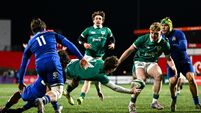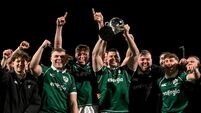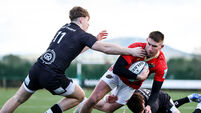Six weeks to shape the Lions’ agenda
While the Heineken Cup has certainly increased the options for the Lions management team to run the rule over potential selections, the international arena affords the opportunity of seeing players perform outside the comfort zone of the club environment.
This year’s Six Nations is fascinating in many ways as there is no outstanding team and with the exception of Italy all the other sides are capable of beating each other. As a result it is unlikely that any country will land a Grand Slam. Scotland, in the doldrums for so long could be the surprise packet. Favoured with three home games, their opening clash against champions Wales will dictate the fortunes of both.
Warren Gatland was barely off the plane before the tournament started last season and quickly had to lift Welsh morale after their shock exit from the World Cup against Fiji.
In an effort to establish familiarity and unity of purpose he gambled in selecting 13 players from the Ospreys for the opening game against England in Twickenham and produced a win against all the odds. At half-time they looked in serious trouble but fortune favoured the brave and Wales rescued the game and claimed victory. From that moment on their season took off.
In this tournament, more that any other, momentum is everything.
Scotland have a chance of creating an upset in their opener in Murrayfield. Their two district sides have performed well in the Heineken Cup and Magners League with that famous win by the Glasgow Warriors in Toulouse proving the highlight. That victory showcased the talents of John Barclay at open side and the flying Evans brothers, Thom and Max, who will add greatly to the options available to Frank Hadden behind the scrum.
Scoring tries has been Scotland’s Achilles’ heel in recent seasons so their emergence will offer huge hope. Their representation on recent Lions tours has been poor, a reflection on the state of their international side. Yet this season the relative merits of front row men Ewan Murray and Ross Ford, along with Nathan Hines in the second row will come under scrutiny. Captain Mike Blair faces stiff competition for the scrum-half berth as do their impressive array of back row players. A strong collective showing will certainly help their cause.
Wales are rightly installed as favourites and consequently are expected to backbone the Lions’ squad. That could all change over the next few weeks. That said, it is impossible to ignore the impact that Gatland has made since his appointment. While winning the Grand Slam last year was a remarkable achievement, given where they were coming from, their form since has cemented the impression that this is a side growing in character and will get even better. The one performance that stands out for me was the second test against South Africa on their tour last June. Short five of their championship winning side and thoroughly outclassed in the first test in Bloemfontein the Welsh regrouped, licked their wounds and were within minutes of beating the world champions in Pretoria.
They now have even greater strength than last year and more options in midfield, with the emergence of Jamie Roberts and Andrew Bishop to pressurise Gavin Henson and Tom Shanklin. The big question hanging over Wales is whether their front five can dominate sufficiently to feed a back line that can be devastating.
Gatland has welcomed the favourites’ tag and is pressurising his players to rise to the challenge. Their trip to the Stade de France looks like the key fixture in the competition and with England and Ireland visiting the Millennium Stadium they will fancy their chances of repeating last year’s success.
Then again not even the great Welsh side of the seventies managed to produce back-to-back Grand Slams. The fact that Gatland, Shaun Edwards and Rob Howley are all involved in the Lions will work to the advantage of some Welsh players but could work against others. The trio will be as familiar with the potential weaknesses in a player as his strengths. Sometimes too much knowledge can work against a player in the selection meeting.
The other great clash on that opening weekend is the meeting of Ireland and France in Dublin. In common with the Murrayfield opener, this game is vital for both teams. While Munster in particular have fared well against French opposition in the Heineken Cup, that success has not translated onto the international stage. France have under-performed at this level for some time yet have dominated the recent tests between the countries. There are also signs that coach Marc Lièvremont has now settled on what he sees as his best side and will unleash a monster pack at Croke Park to frustrate Ireland up front.
Lievremont has omitted impressive Heineken Cup performers in Alexandre Audebert, Elvis Vermeulen, Thibaut Privat and Loic Jacquet who excelled up front for Clermont Auvergne along with Yannick Nyanga from Toulouse which suggests he is either horribly off the mark or has an embarrassment of riches in the forwards.
He still has problems at half-back and has selected only Lionel Beauxis in the position, despite the fact that he has performed at full-back for a lot of the season. His omission of Clermont scrum-half Pierre Mignoni also seems strange. As always he has an embarrassment of riches in the three quarters but so much will depend on what happens in front of them.
The one area that Lievremont has addressed since coming on board is the French scrum. A key element of their game for so long, this vital phase was ignored under Bernard Laporte’s regime.
Against Argentina last autumn Lievremont introduced Fabien Barcella and Benoit Lecouls with such effect that they decimated the famed Puma scrum. With the experienced Nicolas Mas also in the squad for Dublin you can take it for granted that the French are gearing up for a massive assault at scrum time.
Ireland’s chances this year will depend on whether or not all of Munster’s tried and trusted forwards can continue to replicate at international level what they have been doing in Europe. It is very difficult for the same players to constantly produce top level performances with the regularity that these men are expected to deliver. That said new forwards coach Gert Smal made a favourable impression over the autumn series and has a huge roll to play over the next few weeks. It will also be a big test for several Irish players in the running for Lions selection as at this stage Ian McGeechan is banking on big performances from Ireland and Wales to justify the impression that those two are likely to supply a bigger contingent of players than England or Scotland.
The real test for Ireland is what happens once they have the ball. The backline, despite the presence of exciting young talent in Keith Earls, Luke Fitzgerald, Tommy Bowe and Rob Kearney to supplement the proven ability offered by Brian O’Driscoll, Shane Horgan, Girvan Dempsey, Geordan Murphy and Ronan O’Gara, has not displayed the cutting edge that such a skilled group of players is capable of.
This championship is make or break for many players, as Declan Kidney, not unlike Michael Cheika with Leinster, must decide on the best blend and balance behind the scrum. The limited opportunities afforded to Gordon D’Arcy in recent weeks must also be a frustration to Kidney who I am sure would love to have seen the Wexford man get some game time in the centre. If Ireland could squeeze a win against France they could be playing for the championship on the last day in Cardiff. The opener is really that important.
Martin Johnson’s Six Nations debut in the managerial hot seat could not have been more accommodating and after facing the southern hemisphere’s big three last autumn, I’m sure he will relish the bit of breathing space the Italian opener will offer. He has inherited a squad in transition but has bravely promoted a host of young players, from London Irish in particular, who have impressed week in week out in the Guinness Premiership.
Against the SANZAR countries, players like Danny Care, Danny Cipriani, Toby Flood, Delon Armitage and Nick Kennedy learned a few harsh lessons and the pace with which they absorb those home truths will dictate just how big an influence they will make in this championship. Johnson has also been hit badly with injuries, especially at open side wing forward where he lost Tom Rees, Lewis Moody and Michael Lipman on successive weekends.
The withdrawal of Bath tight head prop and Lions hopeful Matt Stevens for a failed drugs test will not have done anything for morale either.
Italy’s poor showing at the 2007 World Cup has left a hangover, despite a very creditable win against Argentina in South America last summer. They had a poor autumn series losing to the Pacific Islands who recorded their first win as an international side. Nick Mallett has his hands full and facing England in the opener affords them an opportunity to stifle an opposition who need an opening day win so badly it could suffocate them.
When it comes to making life difficult for teams nobody can frustrate more than the Italians. As always though they will be left fighting above their weight over the next two months.
Overall, it is hard to ignore the quality the Welsh even if France will push them all the way. The high octane running game favoured by Wales may well separate them from the pack. From Ian McGeechan’s perch, he will hope to see a strong challenge from Scotland and England and a return to the form that made Ireland such formidable opposition in this great competition since 2000.





